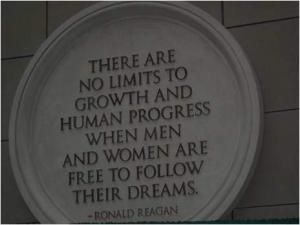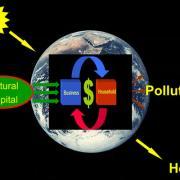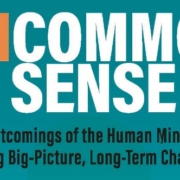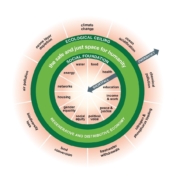Mountebank Wins Nobel for Infinite Planet Theory
by Rob Dietz
 Few people have read the dense volumes published by the economist Milton Mountebank, but his work has affected you, me and every single person on the planet. Dr. Mountebank has revolutionized economic thought, and now he has been recognized for his singular efforts. Yesterday at a gala reception in Stockholm, Sweden, the chairman of Sveriges Riksbank, Peter Norborg, presented Dr. Mountebank with the Nobel Prize in Economics for his lifetime of work on infinite planet theory.
Few people have read the dense volumes published by the economist Milton Mountebank, but his work has affected you, me and every single person on the planet. Dr. Mountebank has revolutionized economic thought, and now he has been recognized for his singular efforts. Yesterday at a gala reception in Stockholm, Sweden, the chairman of Sveriges Riksbank, Peter Norborg, presented Dr. Mountebank with the Nobel Prize in Economics for his lifetime of work on infinite planet theory.
In his presentation of the award, Mr. Norborg stated, “Dr. Mountebank has demonstrated imagination and inventiveness beyond what the rational mind can comprehend.” Indeed, it is because of his theories that we all do what we do economically. Nations strive for continuous GDP growth and endless expansion of consumption thanks to infinite planet theory. Mr. Norborg went on to say, “All of our banks, including Sveriges Riksbank, owe him a huge debt. We finance economic expansion. Our actions and decisions would be morally suspect if we lived on a finite planet.”
In a light-hearted moment during the presentation, Mr. Norborg asserted that Dr. Mountebank had provided an even greater service to humanity by reducing stress on individuals. “Best of all,” he said, “is that we can extract, consume and digest resources guilt-free. Planetary constraints have been conquered. They have gone the way of the dodo, the Roman Empire and the world’s major fisheries.”

Reagan's nod to Mountebank, etched in stone at the International Trade Center in Washinton, DC. Photo by Rob Dietz
Although Dr. Mountebank’s books have failed to reach mainstream audiences, his work has been highly influential among elite political and corporate leaders. Ronald Reagan is a prominent example. President Reagan once famously said, “There are no limits to growth and human progress when men and women are free to follow their dreams.” That’s a close paraphrasing of Dr. Mountebank’s conclusion to his magnum opus, Infinity and Beyond: The Magical Triumph of Economics over Physics. Phillip van Uppington, former vice president at Lehman Brothers, asserts that Dr. Mountebank was a huge influence on his firm. “We used to quote him all the time. One of the highlights of my career was the symposium I arranged a few years back with Mountebank and Milton Friedman. We called it ‘Double Milton Day.’ It really opened our minds to the possibilities of innovative finance. Once we implemented the double Milton doctrines, we made more cash than most small nations.”
In his acceptance speech, Dr. Mountebank told the story of how he developed infinite planet theory. “Equations, equations, equations,” he said, “I would see them dancing across my eyelids as I laid down to sleep. In the morning I would wake up and write them out. I did this for three straight years until I finally put it all together.” The centerpiece of Mountebank’s mathematical demonstration of the feasibility of infinite growth is his conjury equation, a recondite multivariate differential expression that, by common agreement, is understood by fewer than four economists in the world. “It’s why I’m standing on this stage today,” Mountebank said. “Unfortunately the equation is too long to fit on the screen behind me, but it’s the key to infinite economic growth. Fortunately, though, you don’t have to be an economist or a statistician to use it as a guide for your daily actions.” Dr. Mountebank continued by holding up a globe in his hand and stating, “We all recognize that the earth is a sphere, and from basic geometry, we all understand that a sphere has no beginning and no end. If you set out in one direction on the surface of a sphere, there is no stopping point—it’s infinite.” He spun the globe and walked his fingers around it to prove his point. “Q.E.D. No end. And that means it can be infinitely exploited for economic gains.”

Dr. Mountebank. Photo by Derrick Tyson.
Infinite planet theory has gained almost unanimous acceptance in economic circles, but there have been some vocal critics. On the day of the award ceremony, a small band of protestors formed a picket line outside Sveriges Riksbank. One protestor was carrying a sign that said “Steady State.” When asked why she was protesting, she said, “Mountebank? You can’t be serious. They should give the Nobel to Herman Daly.” Dr. Daly is known for his work on the limits to growth and the steady state economy, concepts which fly in the face of infinite planet theory. The Club of Rome provided the original critique of the theory when it published its bestselling book, The Limits to Growth. In his writings, however, Dr. Mountebank has dismissed the notion of limits. One of the passages in Infinity and Beyond says:
The end of cheap oil, species extinctions, climate change, deforestation, resource depletion, crippling poverty, loss of ecosystem services, soil and aquifer degradation—these are trifling problems, so long as we continue to grow the economy toward its ultimate size: infinity and beyond. Under no circumstances should we allow creeping thoughts about a finite planet or constraints handed down by universal physical laws to get in the way of building a bigger economy. And certainly we should shut our ears to the dreary doomsayers who continue to rain their inane facts upon our parade of growth. Growth, alone, is the moral and political ideal.
Dr. Mountebank ended his acceptance speech on a personal note, observing how infinite planet theory had soothed the fears of his young grandchildren. He said, “They told me they were scared about what was happening to the environment. I patted their little heads and told them not to worry. After all, you can’t harm nature on an infinite planet. By definition, there’s always more.”
Dr. Mountebank is the eighth Nobel laureate in economics from Fantasia University.







It would be funny if it wasn’t so true.
Welcome back Dr Strangelove and Mutually Assured Destruction.
As I’ve said many times before, the fact that the Nobel people give a prize for economics shows they have too much time and money on their hands. Mountebank is currently working on a theory for the fountain of youth.
Whats about K E Boulding’s ‘Economics of Coming spaceship Earth’?????????
Is this a joke? Please tell me our leaders aren’t basing their decisions on this absurdity.
If a sphere is not finite, then what is? Any object is, by definition, finite it seems. The guy needs to read some Georgescu-Roegen and ponder arithmomorphic concepts.
The world of the mind can be infinite, and can get infinitely lost in pondering infinity – that’s what I think happened. “Milton…come back – we’re over here on planet Earth.”
Hi Rob Dietz, briliantly exposed the idiotic mindset of those who do not understand the limits of what the Earth’s biosphere can offer to human “enterprize” ! One of my rich ( financially ) golf buddies tels me that I do not need to worry about humans running our of natural resources since when he flies above the Earth, all that he sees are the “..infinite green spaces…”, which are “…unused by humans…!!! The poor man refuses to accept my contention that ALL of that green space is already covering human habitations and other uses to the point that any further use of it would result in total collapse of the biospheric
life system! About 25 years ago he told me that US could easily accomodate at least another 150 cities like New York – and still be able to “…live comfortably..”. when I asked him where thery will find the food to feed themselves, he said: “…don’t you know about growing food at the rooftops – in hydrophonic greenhouses…” !!? He has never heard that in many regions of the globe poor people are already dying of thirst due to the shortage of potable dirinking water. Please keep on doing good work on awakening the misquided segment of humanity to the dangers of this kind of thinking . Dan Kustudich
The problem with this article is that it can mislead people into thinking it is true. The Nobel prize is given out in December and the last line of the article is also a give away. I’m not sure what is accomplished by this.
This was a good piece!
Thanks Rob Dietz!
Thank you, Mr. Dietz, for this timely update on the activities of the Nobel Memorial Prize committee. It’s good to see that they are duly rewarding the work of a man who will surely be seen in historical hindsight as one of the most important thinkers of the early 21st century! Many people fear we are moving into a period when we will begin to experience what might be considered the negative consequences of the end of cheap oil, species extinctions, climate change, deforestation, resource depletion, crippling poverty, loss of ecosystem services, and soil and aquifer degradation. Thanks to the ground-breaking work of Dr. Mountebank, we can rest assured that not only are these not actual problems, but that, moreover, it is now possible to logically demonstrate the impossibility of infinite growth even having negative consequences.
For those who are familar with ‘the other Milton’s’ essay on “Methodology in Positive Economics, the affinity between Dr. Mountebank and the late Dr. Friedman will be understandable. Friedman’s essay is somewhat technical and might even be described as rough sledding for those lacking technical training in economics, but its point can easily be summarized. It is that starting with erroneous premises and building on them with flawed logic is an acceptable basis for economics, the reason being that this was what Friedman thought real scientists did. The enormous advantage of this approach, obviously, follows from the logical concept that any proposition can be proven from a contradiction, given enough time, blackboard space, and chalk. From any of the commonly accepted axioms of conventional economics, for example, it is relatively easy to demonstrate that black is white, freedom is slavery, or that if you follow your dreams, there are no limits to growth and human progress.
Thank you, Sveriges Riksbank! We are all Dr. Mountebank’s grandchildren now.
I like the Nobel Prize for Herman Daly idea (and maybe a couple of other Ecological Economists or genuine national accounts measures researchers could share it). Have Ecological Economists been nominated?
Is this guy talking about the planet earth? There must be some other infinite planet out there that only the elite can teleport to. Maybe it’s planet fantasia…nice joke guys.
It used to be that April Fools Day came once a year. Now it is a year round phenomena.
I was hoping to get a chuckle.
“Another way to lighten your mood”.
Didn’t work for me (quite the opposite). A little more silliness (as opposed to absurdity alone) is needed to get the smiles going early in the AM.
Keep trying! :)
——
Here’s my attempt:
An ecological economist and would-be snob of the single malt goes into a bar…
“why the droopy face,” says the bartender?
“I can’t enjoy a good drink,” says the thinker.
“Well, why not?”
“Cuz water is a closed loop, and I know where that whiskey has been!”
Did you all see the piece on Dr. Mountebank yesterday evening on Fox News? They ran the picture, cobbled together a bio from somewhere, and had three prominent economists praising Dr. Mountebank’s extraordinary work: Jonathan Gruber from MIT, Mark Zandi from Moody’s, and Timothy (“The stimulus destroyed 500,000 jobs!”) Conley. They also mentioned that his book, Infinity and Beyond, will soon be issued in a trade paperback edition, $19.95 at Narnes and Boble, or on your e-book.
Very funny, thanks!
Gotta love them Foxes. http://nymag.com/news/media/roger-ailes-fox-news-2011-5/
A propos de Dr. Mountebank and consumerism/strategies for consumption: time to (re)watch The Century of the Self. It’s on YouTube.
bon bon.
had me completely suckered in, until i reached fantasia.
you’d think the creepy photo wld have given it away earlier, but it looked fairly indicative of what such a human being wld look like.
great piece.
Very funny satire, Rob Dietz. A good article to read by Milton Friedman is his 1970 article in the New York Times, “The Social REsponsibility of a Business is Profit.” Several of his basic assumptions are laid out there and not so difficult to discern. Now, this Milton Mountebank may wish he had written it. Of course, we shouldn´t forget the great Hartwick Rule of infinite substitutability. Jonathan Harris of Tufts has written has great intro paper on sustainability which mentions the Hartwick Rule. Herman DAly also does in various works, of course.
On the reality side, it is good to know that Elinor Ostrom, who was awarded the Riksbank Nobel in 2010, is a member of the Eco Econ society! Astoundingly, she has done actual field work. That of course is in addition to Nobel Peace Prize winners Wangari Maathai, Muhammad Yunus, and the IPCC group and Al Gore.
Moreover, two other prize groups are excellent resources for steady staters: the Right Livelihood Awards and the Goldman Environmental Awards. They might make Dr. Mountebank roll in his living grave, however. Yikes!
Nobel prizes for economics should be awarded posthumously — about 200 years posthumously.
The late Julian Simon was a real economic clap-trapper. He said all of the world’s population could live in a state the size of Texas, with everyone in a single family house and a couple of cars. Houston and Dallas are already overcrowded, with just a fraction of the world’s population. Julian Simon said more people means more “problem solvers”. Not necessarily so! Usually more people just means more pollution and consumption.
This Mountebank satire is pretty clever. I call the prevailing western economic thought Hyper Capitalism. The folks who push it are all hyped up and they hype a false theory. They are “hyped up” just like a meth addict, lots of pointless activity and frenetic running around, leading to premature death, in this case, of a planet. Always you hear of hyper-capitalists focused on the “bottom line”, the net income. Well, they push a lot of costs onto the general society and they simply reap the profit, while 99% of the people reap the problems associated with their endless greed.
A better concept is PURPOSEFUL economic activity, such that a given service or good is NEEDED and is high quality and strives to be sustainable and recyclable. Most of the consumer goods we have in the USA are pretty frivolous and unnecessary. People buy the junk because of peer pressure or because they are bored.
You gave me such a fright! ;-) I was awaiting for an evidence that it was a joke… until the last sentence! Let me copy a piece of my writing about the issue, could be helpful to others:
“The problem might not be in Economics science itself, but in the contrast among the limitation of resources that it has been assigned to deal with and, on the other side, the overarching leading role in development that it has been attributed. Many economists have argued against the growth paradigm. Daly (1977) proposed to replace the ‘more is better’ with the much sounder axiom ‘enough is best’. He defined a steady-state economy as an economy with constant stocks of people and artefacts, maintained at some desired, sufficient levels by low rates of maintenance throughput, that is, by the lowest feasible flows of matter and energy from the first stage of production to the last stage of consumption. As per the drivers for change, he said that the Keynesian revolution only occurred following the Great Depression, which convinced people that something was wrong. Likewise it will probably take a ‘great ecological spasm’ to convince people that something is wrong with an economic theory that denies the very possibility of an economy exceeding its optimal scale. But even in that unhappy event, it is still necessary to have an alternative vision ready to present when crisis conditions provide a receptive public. Much before, J.K. Galbraith (1956) warned that sooner rather than later our concern with the quantity of goods produced – the rate of increase in GNP– would have to give way to the larger question of the quality of life that it provided. J.S. Mill (1848) stated one century before that the increase of wealth is not boundless. J.M. Keynes (1935) claimed for a move to more value ends than money, from the good to the useful. He said that the difficulty for change lies, not in the new ideas, but in escaping from the old ones, which ramify, for those brought up as most of us have been, into every corner of our minds. M. Friedman (1982:ix) said that “only a crisis—actual or perceived—produces real change. When that crisis occurs, the actions that are taken depend on the ideas that are lying around. That, I believe, is our basic function: to develop alternatives to existing policies, to keep them alive and available until the politically impossible becomes politically inevitable”. N. Georgescu-Roegen (1976), father of the degrowth movement, defended the pre-eminence of values over prices. E.F. Schumacher (1989) certified that a way of life that bases itself on permanent limitless expansionism in a finite environment cannot last long. J. Quelch remarks that the mass consumption of the 1990s is fast fading in the rearview mirror (Peck 2008).
Daly (1972) proposed the socially benign directions of small scale, decentralization, increased durability of products, with an increased long-run efficiency in the use of scarce resources, and a low rate of material throughput, lying within the regenerative and assimilative capacities of the ecosystem. But forty years later, we still miss and have urgency for a viable macroeconomic model in which these conditions can be achieved. None of the existing models accounts fully for the dependency of the macroeconomy on ecological variables such as resources and emissions (Jackson 2009). Growth imperative has shaped the architecture of the modern economy, loosening regulations and fostering a proliferation of unstable financial derivatives as an essential mechanism to stimulate consumption growth (ibid.). A zero-growth economy is incompatible with a debt-based monetary system (Moore 2010). The foundations of our current debt-based monetary economics, is fundamentally addicted to growth to provide for the need for interest (ibid.). This model was always unstable ecologically and has now proven itself unstable economically (Jackson 2009). An economy focused on the growth of the market, as measured by GDP, does no longer make sense, without assuming the social and environmental, positive and negative externalities (Costanza 2009).”
Maybe if we all moved to Jupiter then M&M’s theory could be given a try. Hey, why don’t we do it?
Very good. I believe Brazilians should also get to know all the achievements of this master scientist. I’m thinking in translating your post.
” Is this a joke? Please tell me our leaders aren’t basing their decisions on this absurdity.
The problem with this article is that it can mislead people into thinking it is true.”
These were two concerns by Frank Chapeau and Babble , but after reading the idiotic statement of Mountebunk – ” “We all recognize that the earth is a sphere, and from basic geometry, we all understand that a sphere has no beginning and no end.” – even a high school student could say, “but it defenitely has a FINITE surface and land area ! ” , and dismiss this fictitious idiot as not worth even thinking about !
Herman Daly was awarded the 1996 Right Livelihood Award, incidentally….